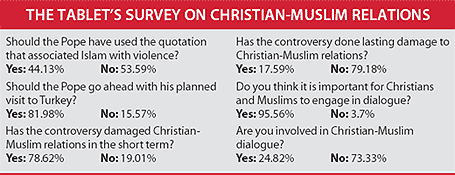
A narrow majority of Christians say that the Pope should not have quoted a derogatory remark about the Prophet Muhammad that sparked protests by Muslims around the world. Just over half the people who took part in a Tablet survey felt that Pope Benedict was wrong in his Regensburg lecture to cite the fourteenth-century Byzantine Emperor Manuel II, who said that Muhammad brought “only evil and inhuman things”.
The picture that emerges is one of Christians who are troubled by the effect Pope Benedict’s remarks will have on relations with Muslims at least in the short term. In spite of fears for the Pope’s safety, a big majority feel he should go ahead with his planned visit to Turkey at the end of November.
They also consider that dialogue between the two faiths is important even if only a quarter are themselves involved in such conversations. More than two-thirds believe that Christians and Muslims should pray together. This finding is striking in the light of Pope Benedict’s own disapproval of the practice. He recently let it be known that interfaith prayer brings with it the risk of relativism. “When we come together for prayer for peace, the prayer must unfold according to the distinct paths that pertain to the various religions,” he said earlier this month, on the twentieth anniversary of the interfaith Assisi gathering arranged by John Paul II.
The most common reasons cited for supporting Christian-Muslim dialogue are that “dialogue is essential to promoting peaceful co-existence between different faiths” and the importance of finding “areas of agreement such as social justice and pro-life issues”. Half agree with the statement that “Muslims need to understand Western values”.
Those most critical of the Pope’s remarks and fearful of the repercussions live in the Middle East, Africa and Asia. Around 63 per cent of these Christians say the Pope should not have used the controversial quotation.
Well over a quarter fear that it will do lasting damage to relations between Christians and Muslims and almost all say it is important for the two faiths to engage in dialogue. More than a third of these respondents are involved in dialogue primarily at their place of work or socially, or at an educational establishment such as school or university.
There is more support for the Pope from Christians in Britain. A narrow majority of these (52 per cent) think Pope Benedict was right to cite the controversial quotation about Muhammad. They feel Christian-Muslim relations will be damaged in the short term (82 per cent) but will recover. The British Christians are also a little less enthusiastic than the rest about praying with Muslims. Just under 59 per cent support the idea.
